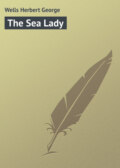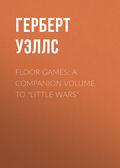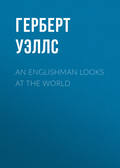
Герберт Джордж Уэллс
Mr. Britling Sees It Through
§ 10
For days the broader side of Mr. Britling's mind, as distinguished from its egotistical edge, had been reflecting more and more vividly and coherently the spectacle of civilisation casting aside the thousand dispersed activities of peace, clutching its weapons and setting its teeth, for a supreme struggle against militarist imperialism. From the point of view of Matching's Easy that colossal crystallising of accumulated antagonisms was for a time no more than a confusion of headlines and a rearrangement of columns in the white windows of the newspapers through which those who lived in the securities of England looked out upon the world. It was a display in the sphere of thought and print immeasurably remote from the real green turf on which one walked, from the voice and the church-bells of Mr. Dimple that sounded their ample caresses in one's ears, from the clashing of the stags who were beginning to knock the velvet from their horns in the park, or the clatter of the butcher's cart and the respectful greeting of the butcher boy down the lane. It was the spectacle of the world less real even to most imaginations than the world of novels or plays. People talked of these things always with an underlying feeling that they romanced and intellectualised.
On Thursday, July 23rd, the Austro-Hungarian minister at Belgrade presented his impossible ultimatum to the Serbian government, and demanded a reply within forty-eight hours. With the wisdom of retrospect we know now clearly enough what that meant. The Sarajevo crime was to be resuscitated and made an excuse for war. But nine hundred and ninety-nine Europeans out of a thousand had still no suspicion of what was happening to them. The ultimatum figured prominently in the morning papers that came to Matching's Easy on Friday, but it by no means dominated the rest of the news; Sir Edward Carson's rejection of the government proposals for Ulster was given the pride of place, and almost equally conspicuous with the Serbian news were the Caillaux trial and the storming of the St. Petersburg barricades by Cossacks. Herr Heinrich's questions at lunch time received reassuring replies.
On Saturday Sir Edward Carson was still in the central limelight, Russia had intervened and demanded more time for Serbia, and the Daily Chronicle declared the day a critical one for Europe. Dublin with bayonet charges and bullets thrust Serbia into a corner on Monday. No shots had yet been fired in the East, and the mischief in Ireland that Germany had counted on was well ahead. Sir Edward Grey was said to be working hard for peace.
"It's the cry of wolf," said Mr. Britling to Herr Heinrich.
"But at last there did come a wolf," said Herr Heinrich. "I wish I had not sent my first moneys to that Conference upon Esperanto. I feel sure it will be put off."
"See!" said Teddy very cheerfully to Herr Heinrich on Tuesday, and held up the paper, in which "The Bloodshed in Dublin" had squeezed the "War Cloud Lifting" into a quite subordinate position.
"What did we tell you?" said Mrs. Britling. "Nobody wants a European war."
But Wednesday's paper vindicated his fears. Germany had commanded Russia not to mobilise.
"Of course Russia will mobilise," said Herr Heinrich.
"Or else forever after hold her peace," said Teddy.
"And then Germany will mobilise," said Herr Heinrich, "and all my holiday will vanish. I shall have to go and mobilise too. I shall have to fight. I have my papers."
"I never thought of you as a soldier before," said Teddy.
"I have deferred my service until I have done my thesis," said Herr Heinrich. "Now all that will be – Piff! And my thesis three-quarters finished."
"That is serious," said Teddy.
"Verdammte Dummheit!" said Herr Heinrich. "Why do they do such things?"
On Thursday, the 30th of July, Caillaux, Carson, strikes, and all the common topics of life had been swept out of the front page of the paper altogether; the stock exchanges were in a state of wild perturbation, and food prices were leaping fantastically. Austria was bombarding Belgrade, contrary to the rules of war hitherto accepted; Russia was mobilising; Mr. Asquith was, he declared, not relaxing his efforts "to do everything possible to circumscribe the area of possible conflict," and the Vienna Conference of Peace Societies was postponed. "I do not see why a conflict between Russia and Austria should involve Western Europe," said Mr. Britling. "Our concern is only for Belgium and France."
But Herr Heinrich knew better. "No," he said. "It is the war. It has come. I have heard it talked about in Germany many times. But I have never believed that it was obliged to come. Ach! It considers no one. So long as Esperanto is disregarded, all these things must be."
Friday brought photographs of the mobilisation in Vienna, and the news that Belgrade was burning. Young men in straw hats very like English or French or Belgian young men in straw hats were shown parading the streets of Vienna, carrying flags and banners portentously, blowing trumpets or waving hats and shouting. Saturday saw all Europe mobilising, and Herr Heinrich upon Teddy's bicycle in wild pursuit of evening papers at the junction. Mobilisation and the emotions of Herr Heinrich now became the central facts of the Dower House situation. The two younger Britlings mobilised with great vigour upon the playroom floor. The elder had one hundred and ninety toy soldiers with a considerable equipment of guns and wagons; the younger had a force of a hundred and twenty-three, not counting three railway porters (with trucks complete), a policeman, five civilians and two ladies. Also they made a number of British and German flags out of paper. But as neither would allow his troops to be any existing foreign army, they agreed to be Redland and Blueland, according to the colour of their prevailing uniforms. Meanwhile Herr Heinrich confessed almost promiscuously the complication of his distresses by a hitherto unexpected emotional interest in the daughter of the village publican. She was a placid receptive young woman named Maud Hickson, on whom the young man had, it seemed, imposed the more poetical name of Marguerite.
"Often we have spoken together, oh yes, often," he assured Mrs. Britling. "And now it must all end. She loves flowers, she loves birds. She is most sweet and innocent. I have taught her many words in German and several times I have tried to draw her in pencil, and now I must go away and never see her any more."
His implicit appeal to the whole literature of Teutonic romanticism disarmed Mrs. Britling's objection that he had no business whatever to know the young woman at all.
"Also," cried Herr Heinrich, facing another aspect of his distresses, "how am I to pack my things? Since I have been here I have bought many things, many books, and two pairs of white flannel trousers and some shirts and a tin instrument that I cannot work, for developing privately Kodak films. All this must go into my little portmanteau. And it will not go into my little portmanteau!
"And there is Billy! Who will now go on with the education of Billy?"
The hands of fate paused not for Herr Heinrich's embarrassments and distresses. He fretted from his room downstairs and back to his room, he went out upon mysterious and futile errands towards the village inn, he prowled about the garden. His head and face grew pinker and pinker; his eyes were flushed and distressed. Everybody sought to say and do kind and reassuring things to him.
"Ach!" he said to Teddy; "you are a civilian. You live in a free country. It is not your war. You can be amused at it…"
But then Teddy was amused at everything.
Something but very dimly apprehended at Matching's Easy, something methodical and compelling away in London, seemed to be fumbling and feeling after Herr Heinrich, and Herr Heinrich it appeared was responding. Sunday's post brought the decision.
"I have to go," he said. "I must go right up to London to-day. To an address in Bloomsbury. Then they will tell me how to go to Germany. I must pack and I must get the taxi-cab from the junction and I must go. Why are there no trains on the branch line on Sundays for me to go by it?"
At lunch he talked politics. "I am entirely opposed to the war," he said. "I am entirely opposed to any war."
"Then why go?" asked Mr. Britling. "Stay here with us. We all like you. Stay here and do not answer your mobilisation summons."
"But then I shall lose all my country. I shall lose my papers. I shall be outcast. I must go."
"I suppose a man should go with his own country," Mr. Britling reflected.
"If there was only one language in all the world, none of such things would happen," Herr Heinrich declared. "There would be no English, no Germans, no Russians."
"Just Esperantists," said Teddy.
"Or Idoists," said Herr Heinrich. "I am not convinced of which. In some ways Ido is much better."
"Perhaps there would have to be a war between Ido and Esperanto to settle it," said Teddy.
"Who shall we play skat with when you have gone?" asked Mrs. Britling.
"All this morning," said Herr Heinrich, expanding in the warmth of sympathy, "I have been trying to pack and I have been unable to pack. My mind is too greatly disordered. I have been told not to bring much luggage. Mrs. Britling, please."
Mrs. Britling became attentive.
"If I could leave much of my luggage, my clothes, some of them, and particularly my violin, it would be much more to my convenience. I do not care to be mobilised with my violin. There may be much crowding. Then I would but just take my rucksack…"
"If you will leave your things packed up."
"And afterwards they could be sent."
But he did not leave them packed up. The taxi-cab, to order which he had gone to the junction in the morning on Teddy's complaisant machine, came presently to carry him off, and the whole family and the first contingent of the usual hockey players gathered about it to see him off. The elder boy of the two juniors put a distended rucksack upon the seat. Herr Heinrich then shook hands with every one.
"Write and tell us how you get on," cried Mrs. Britling.
"But if England also makes war!"
"Write to Reynolds – let me give you his address; he is my agent in New York," said Mr. Britling, and wrote it down.
"We'll come to the village corner with you, Herr Heinrich," cried the boys.
"No," said Herr Heinrich, sitting down into the automobile, "I will part with you altogether. It is too much…"
"Auf Wiedersehen!" cried Mr. Britling. "Remember, whatever happens there will be peace at last!"
"Then why not at the beginning?" Herr Heinrich demanded with a reasonable exasperation and repeated his maturer verdict on the whole European situation; "Verdammte Bummelei!"
"Go," said Mr. Britling to the taxi driver.
"Auf Wiedersehen, Herr Heinrich!"
"Auf Wiedersehen!"
"Good-bye, Herr Heinrich!"
"Good luck, Herr Heinrich!"
The taxi started with a whir, and Herr Heinrich passed out of the gates and along the same hungry road that had so recently consumed Mr. Direck. "Give him a last send-off," cried Teddy. "One, Two, Three! Auf Wiedersehen!"
The voices, gruff and shrill, sounded raggedly together. The dog-rose hedge cut off the sight of the little face. Then the pink head bobbed up again. He was standing up and waving the panama hat. Careless of sunstroke…
Then Herr Heinrich had gone altogether…
"Well," said Mr. Britling, turning away.
"I do hope they won't hurt him," said a visitor.
"Oh, they won't put a youngster like that in the fighting line," said Mr. Britling. "He's had no training yet. And he has to wear glasses. How can he shoot? They'll make a clerk of him."
"He hasn't packed at all," said Mrs. Britling to her husband. "Just come up for an instant and peep at his room. It's – touching."
It was touching.
It was more than touching; in its minute, absurd way it was symbolical and prophetic, it was the miniature of one small life uprooted.
The door stood wide open, as he had left it open, careless of all the little jealousies and privacies of occupation and ownership. Even the windows were wide open as though he had needed air; he who had always so sedulously shut his windows since first he came to England. Across the empty fireplace stretched the great bough of oak he had brought in for Billy, but now its twigs and leaves had wilted, and many had broken off and fallen on the floor. Billy's cage stood empty upon a little table in the corner of the room. Instead of packing, the young man had evidently paced up and down in a state of emotional elaboration; the bed was disordered as though he had several times flung himself upon it, and his books had been thrown about the room despairfully. He had made some little commencements of packing in a borrowed cardboard box. The violin lay as if it lay in state upon the chest of drawers, the drawers were all partially open, and in the middle of the floor sprawled a pitiful shirt of blue, dropped there, the most flattened and broken-hearted of garments. The fireplace contained an unsuccessful pencil sketch of a girl's face, torn across…
Husband and wife regarded the abandoned room in silence for a time, and when Mr. Britling spoke he lowered his voice.
"I don't see Billy," he said.
"Perhaps he has gone out of the window," said Mrs. Britling also in a hushed undertone…
"Well," said Mr. Britling abruptly and loudly, turning away from this first intimation of coming desolations, "let us go down to our hockey! He had to go, you know. And Billy will probably come back again when he begins to feel hungry…"
§ 11
Monday was a public holiday, the First Monday in August, and the day consecrated by long-established custom to the Matching's Easy Flower Show in Claverings Park. The day was to live in Mr. Britling's memory with a harsh brightness like the brightness of that sunshine one sees at times at the edge of a thunderstorm. There were tents with the exhibits, and a tent for "Popular Refreshments," there was a gorgeous gold and yellow steam roundabout with motor-cars and horses, and another in green and silver with wonderfully undulating ostriches and lions, and each had an organ that went by steam; there were cocoanut shies and many ingenious prize-giving shooting and dart-throwing and ring-throwing stalls, each displaying a marvellous array of crockery, clocks, metal ornaments, and suchlike rewards. There was a race of gas balloons, each with a postcard attached to it begging the finder to say where it descended, and you could get a balloon for a shilling and have a chance of winning various impressive and embarrassing prizes if your balloon went far enough – fish carvers, a silver-handled walking-stick, a bog-oak gramophone-record cabinet, and things like that. And by a special gate one could go for sixpence into the Claverings gardens, and the sixpence would be doubled by Lady Homartyn and devoted next winter to the Matching's Easy coal club. And Mr. Britling went through all the shows with his boys, and finally left them with a shilling each and his blessing and paid his sixpence for the gardens and made his way as he had promised, to have tea with Lady Homartyn.
The morning papers had arrived late, and he had been reading them and re-reading them and musing over them intermittently until his family had insisted upon his coming out to the festivities. They said that if for no other reason he must come to witness Aunt Wilshire's extraordinary skill at the cocoanut shy. She could beat everybody. Well, one must not miss a thing like that. The headlines proclaimed, "The Great Powers at War; France Invaded by Germany; Germany invaded by Russia; 100,000 Germans march into Luxemburg; Can England Abstain? Fifty Million Loan to be Issued." And Germany had not only violated the Treaty of London but she had seized a British ship in the Kiel Canal… The roundabouts were very busy and windily melodious, and the shooting gallery kept popping and jingling as people shot and broke bottles, and the voices of the young men and women inviting the crowd to try their luck at this and that rang loud and clear. Teddy and Letty and Cissie and Hugh were developing a quite disconcerting skill at the dart-throwing, and were bent upon compiling a complete tea-set for the Teddy cottage out of their winnings. There was a score of automobiles and a number of traps and gigs about the entrance to the portion of the park that had been railed off for the festival, the small Britling boys had met some nursery visitors from Claverings House and were busy displaying skill and calm upon the roundabout ostriches, and less than four hundred miles away with a front that reached from Nancy to Liège more than a million and a quarter of grey-clad men, the greatest and best-equipped host the world had ever seen, were pouring westward to take Paris, grip and paralyse France, seize the Channel ports, invade England, and make the German Empire the master-state of the earth. Their equipment was a marvel of foresight and scientific organisation, from the motor kitchens that rumbled in their wake to the telescopic sights of the sharp-shooters, the innumerable machine-guns of the infantry, the supply of entrenching material, the preparations already made in the invaded country…
"Let's try at the other place for the sugar-basin!" said Teddy, hurrying past. "Don't get two sugar-basins," said Cissie breathless in pursuit. "Hugh is trying for a sugar-basin at the other place."
Then Mr. Britling heard a bellicose note.
"Let's have a go at the bottles," said a cheerful young farmer. "Ought to keep up our shooting, these warlike times…"
Mr. Britling ran against Hickson from the village inn and learnt that he was disturbed about his son being called up as a reservist. "Just when he was settling down here. It seems a pity they couldn't leave him for a bit."
"'Tis a noosence," said Hickson, "but anyhow, they give first prize to his radishes. He'll be glad to hear they give first prize to his radishes. Do you think, Sir, there's very much probability of this war? It do seem to be beginning like."
"It looks more like beginning than it has ever done," said Mr. Britling. "It's a foolish business."
"I suppose if they start in on us we got to hit back at them," said Mr. Hickson. "Postman – he's got his papers too…"
Mr. Britling made his way through the drifting throng towards the little wicket that led into the Gardens…
He was swung round suddenly by a loud bang.
It was the gun proclaiming the start of the balloon race.
He stood for some moments watching the scene. The balloon start had gathered a little crowd of people, village girls in white gloves and cheerful hats, young men in bright ties and ready-made Sunday suits, fathers and mothers, boy scouts, children, clerks in straw hats, bicyclists and miscellaneous folk. Over their heads rose Mr. Cheshunt, the factotum of the estate. He was standing on a table and handing the little balloons up into the air one by one. They floated up from his hand like many-coloured grapes, some rising and falling, some soaring steadily upward, some spinning and eddying, drifting eastward before the gentle breeze, a string of bubbles against the sky and the big trees that bounded the park. Farther away to the right were the striped canvas tents of the flower-show, still farther off the roundabouts churned out their music, the shooting galleries popped, and the swing boats creaked through the air. Cut off from these things by a line of fencing lay the open park in which the deer grouped themselves under the great trees and regarded the festival mistrustfully. Teddy and Hugh appeared breaking away from the balloon race cluster, and hurrying back to their dart-throwing. A man outside a little tent that stood apart was putting up a brave-looking notice, "Unstinted Teas One Shilling." The Teddy perambulator was moored against the cocoanut shy, and Aunt Wilshire was still displaying her terrible prowess at the cocoanuts. Already she had won twenty-seven. Strange children had been impressed by her to carry them, and formed her retinue. A wonderful old lady was Aunt Wilshire…
Then across all the sunshine of this artless festival there appeared, as if it were writing showing through a picture, "France Invaded by Germany; Germany Invaded by Russia."
Mr. Britling turned again towards the wicket, with its collectors of tribute, that led into the Gardens.







